Taxiride is an Australian rock band. Formed in Melbourne by singer/songwriters Tim Watson, Tim Wild, who were soon joined by Jason Singh, and Dan Hall. Taxiride would record two consecutive number one platinum-selling albums. The band have had nine top 40 singles include top five hits Get Set, Everywhere You Go and the most played song on Australian radio in 2002, Creepin' Up Slowly .

"Eternal Flame" is a song by American pop rock group the Bangles for their third studio album, Everything (1988). Released on January 23, 1989, the power ballad was written by group member Susanna Hoffs with the established hit songwriting team of Billy Steinberg and Tom Kelly. Upon its 1989 single release, "Eternal Flame" became a number-one hit in nine countries, including Australia, Sweden, the United Kingdom, and the United States. Since its release, it has been covered by many musical artists, including Australian boy band Human Nature, who reached the Australian top 10 with their version, and British girl group Atomic Kitten, who topped four national charts with their rendition.

"In Your Eyes" is a song by Australian singer Kylie Minogue, taken from her eighth studio album, Fever (2001). It was written by Minogue, Richard Stannard, Julian Gallagher, and Ash Howes and produced by Stannard and Gallagher. It is a dance-pop song and talks about sexual temptation. The song was released in Australia on 21 January 2002 as the second single from the album. In Europe, it was delayed from a January release due to the success of "Can't Get You Out of My Head", and it was eventually issued on 18 February 2002 by Parlophone.
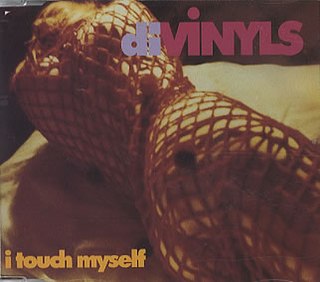
"I Touch Myself" is a song recorded by Australian rock band Divinyls. It was written by the songwriting team of Tom Kelly and Billy Steinberg along with Christine Amphlett and Mark McEntee of the Divinyls. It was released in November 1990 by Virgin as the lead single from the band's fourth album, Divinyls (1991), and deals with the subjects of eroticism and female masturbation. The single achieved success, reaching No. 1 in Australia and No. 4 on the US Billboard Hot 100. In January 2018, Australian network Triple M ranked the song at No. 60 in its list of the "most Australian" songs of all time. In 2023, Billboard magazine ranked it among the "500 Best Pop Songs of All Time".
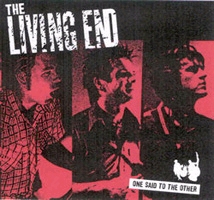
"One Said to the Other" is a song by Australian punk rock band the Living End. It was released on 20 January 2003 as the first single from their third album, Modern ARTillery (2003). The song peaked at No. 19 on the Australian ARIA Singles Chart and was ranked No. 52 on Triple J's Hottest 100 for 2003.

"Round Round" is a song performed by British girl group Sugababes. It was written by group members Keisha Buchanan, Mutya Buena, and Heidi Range, as well as Miranda Cooper, Brian Higgins, Tim Powell, Nick Coler, and Lisa Cowling. It samples the song "Tango Forte" by German production team Dublex Inc., so the songwriters of that track are credited as well. Produced by Kevin Bacon and Jonathan Quarmby, the song was released as the second single from the group's second studio album, Angels with Dirty Faces (2002).

"All the Way to Reno (You're Gonna Be a Star)" is a song by American rock band R.E.M. It was released on July 23, 2001 as the second single from the band's twelfth studio album, Reveal (2001). The single did not chart on the US Billboard Hot 100, but it did reach number 24 on the UK Singles Chart, number 31 in Italy, and number 34 in Ireland.

"Born to Try" is a song by Australian singer-songwriter Delta Goodrem, written by Goodrem and Audius Mtawarira and produced by Ric Wake for Goodrem's debut studio album, Innocent Eyes (2003). The song was released as the first single off the studio album on 11 November 2002 by Epic Records. It was later featured on her first Japanese compilation album Innocent Eyes (2006). The song was co-written by her while she was staying at her home in Sydney, Australia, for the production of the studio album, as well as written and producing four other songs together.

Jason Mahendra Singh is an Australian singer-songwriter-guitarist. Since 1997 he has performed in rock band Taxiride as co-lead singer alongside Tim Watson and Tim Wild. In March 2009 he issued a duet single, "The World As You Know It", with Todd Watson, that peaked at No. 10 on the ARIA Club Tracks chart.

"I Love It When We Do" is the second single from Irish singer-songwriter Ronan Keating's second studio album, Destination. It was first released in Australia on 2 September 2002 and was issued in the United Kingdom seven days later. The single peaked at number five on the UK Singles Chart and reached the top 40 in Australia and Ireland. In 2003, Keating re-recorded the song with additional vocals from French actress and singer Cécilia Cara, re-titled "Je t'aime plus que tout". This version peaked at number 11 in France and number nine in the Wallonia region of Belgium.
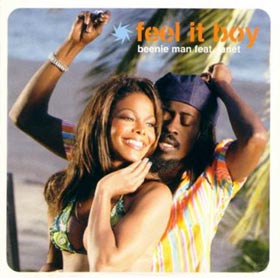
"Feel It Boy" is a song by Jamaican dancehall musician Beenie Man featuring American singer Janet Jackson from Beenie Man's 15th studio album, Tropical Storm (2002). The song was written by Beenie Man, Pharrell Williams, Chad Hugo, and Clancy Eccles and was produced by the Neptunes. Virgin Records released the song on 15 July 2002 as the lead single from the album. "Feel It Boy" peaked at number nine on the UK Singles Chart and became a top-40 hit in eight other countries, including the United States, where it peaked at number 28.
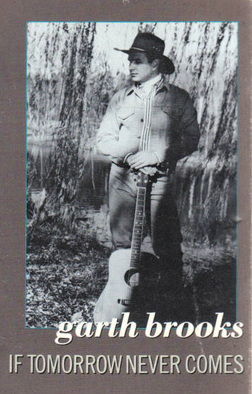
"If Tomorrow Never Comes" is a song by American country music artist Garth Brooks. Written by Brooks and Kent Blazy, it was released in August 1989 as the second single from his self-titled debut album. The track was his first number-one single on the US Billboard Hot Country Singles chart, and Brooks refers to it as his signature song. "If Tomorrow Never Comes" was named Favorite Country Single in the American Music Awards of 1991.

"Run" is a song by British musical duo Lighthouse Family, released as the second single from their third studio album, Whatever Gets You Through the Day (2001). The song was produced by Kevin Bacon and Jonathan Quarmby. It was released on 25 February 2002 and reached the top 30 in the United Kingdom as well as number two in the Czech Republic.

"Get Set" is the debut single by Australian band Taxiride written by founding member and co-lead vocalist Tim Wild. The song was recorded at Ocean Way Studios, Los Angeles, and produced by Jack Joseph Puig. Released in May 1999, it peaked within the top 10 in Australia and also reached number 41 in New Zealand. At the ARIA Music Awards of 1999, the song was nominated for two awards: 'Breakthrough Artist – Single' and 'Best Pop Release', winning the former.

"Creepin' Up Slowly" is the lead single and the third track from Australian rock band Taxiride's second album, Garage Mahal. This single was released on 10 June 2002. The song was recorded in Ocean Way Studios, Los Angeles, and produced by Jack Joseph Puig, as with all their previous singles. It was written by the group's Jason Mahendra Singh, Timothy Harcourt Watson and Timothy Andrew Wild, together with the American production and songwriting team Dow S Brain and Bradley K Young. It became Taxiride's second top-10 hit in Australia, reaching No. 6 on the ARIA Singles Chart, and also peaked at No. 19 on the New Zealand Singles Chart. In Australia, it was certified platinum for shipment of 70,000 units by the end of 2002.

"Heaven Is a Halfpipe" (also known as "Heaven Is a Halfpipe (If I Die)") is a song by American rock band OPM. It was included on their debut studio album, Menace to Sobriety (2000), and was released on June 27, 2000, as its lead single.
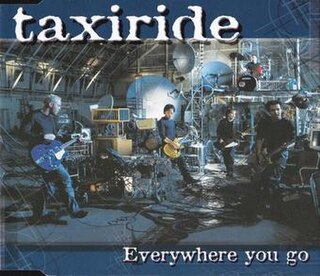
"Everywhere You Go" is Australian rock band Taxiride's second single, written by founding members and co-lead singers Tim Wild and Tim Watson. It was released as the band's second single from their 1999 debut album, Imaginate, in September 1999, becoming the band's second top-20 single in their home country. It was certified gold by the Australian Recording Industry Association (ARIA).
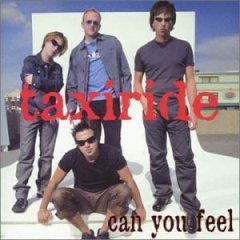
"Can You Feel" is the third single by Australian rock band Taxiride, written by founding member and co-lead vocalist Tim Wild. It was released as the band's third single from their debut album, Imaginate, in January 2000, becoming the band's third top-40 single reaching #35 in the ARIA Charts.

"Afterglow" is a song by Australian rock band Taxiride, written by band members Jason Singh, Tim Wild, and Tim Watson. It was released on 10 February 2003 as the third and final single from their second studio album, Garage Mahal. It reached No. 49 on the Australian ARIA Singles Chart.

"Oh Yeah" is a song by Australian rock band Taxiride, written by founding member and co-lead vocalist Tim Wild. It was released as the first single from their third studio album, Axiomatic, in August 2005. It was their first independent release since leaving Warner Music Group in 2004. The track reached No. 40 in Australia.



















